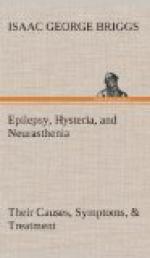PREFACE
I hope this book will meet a real need, for when one considers how prevalent epilepsy, hysteria and neurasthenia are, among all ranks and ages of both sexes, it seems remarkable some such popular book was not written long ago.
I add nothing to our knowledge of these ills, my object being to put what we know into simple words, and to insist on the necessity for personal discipline being allied to expert aid. The book aims at helping, not ousting, the doctor, who may find it of use in getting his patient to see—and to act on—the obvious.
“Nervous Disease”, as here used, includes only the three diseases treated of; “Neuropath”—victims of them.
“Advice” to a neuropath is usually a very depressing decalogue of “Thou Shalt Nots!” If it be made clear why he must not do so-and-so, the patient endeavours to obey; peremptorily ordered to obey, he rebels. Much sound advice is wasted for lack of an interesting, convincing, “Reason Why!” which would ensure the hearty and very helpful co-operation of a patient who had been taught that writing prescriptions is not the limit of a doctor’s activities.
Many folk, with touching belief in his own claims, regard the quack as a hoary-headed sage, who from disinterested motives devotes his life to curing ailments, by methods of which he alone has the secret, at low fees. To fight this dangerous idea I have tried to show in an interesting way how science deals with nerve ills, and to prove that qualified aid is needed. Suggestions and criticisms will be welcomed.
I.
G. Briggs
the University,
Birmingham,
June,
1921
* * * * *
“Lette than clerkes enditen in Latin, for they have the propertie of science, and the knowing in that facultie: and lette Frenchmen in their Frenche also enditen their queinte termes, for it is kyndely to their mouthes; and let us showe our fantasies in soche wordes as we lerneden of our dames tongue.”
—Chaucer.
* * * * *
Epilepsy, hysteria,
and neurasthenia
* * * * *
CHAPTER I
MAJOR AND MINOR EPILEPSY
(Grand and Petit Mal)
“My son is sore vexed, for ofttimes he falleth into the fire, and ofttimes into the water.”—Matthew xvii, 15.
“Oft, too, some wretch before our
startled sight,
Struck as with lightning with some keen
disease,
Drops sudden: By the dread attack
o’erpowered
He foams, he groans, he trembles, and
he faints;
Now rigid, now convuls’d, his labouring
lungs
Heave quick, and quivers each exhausted
limb.
* * * * *




